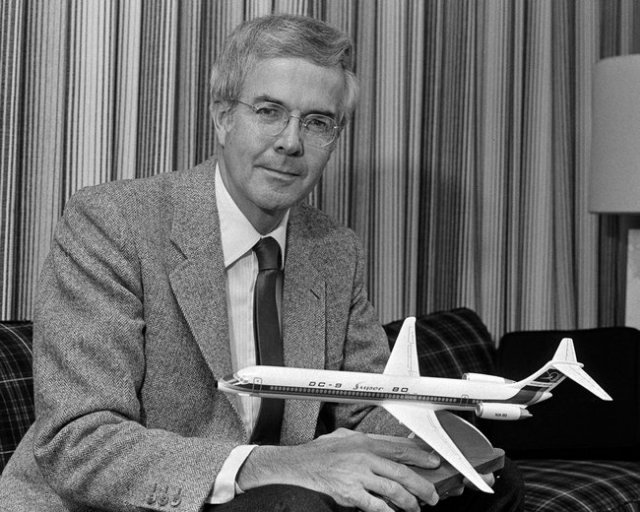Sanford N. McDonnell, who succeeded his uncle as chairman of the aerospace company McDonnell Douglas and, through the 1980s, modernized its management systems, remade the corporate culture and sharply increased earnings, died on Monday at his home in Clayton, Mo. He was 89.
The cause was complications of pancreatic cancer, his son, Randall, said.
Mr. McDonnell, an engineer, became chairman of the company in 1980 after the death of its founder, his uncle James Smith McDonnell, who had run it for four decades.
The younger Mr. McDonnell set out to make the corporate culture less autocratic and to turn around its unprofitable commercial airline division. He also helped develop some of the company’s most successful fighter planes, including the F-4 Phantom II.
During his tenure, the company’s earnings rose sharply, and new management made the commercial airline division profitable, though the company remained slow to invest in new technology.
Mr. McDonnell was chief executive when McDonnell Douglas completed the Skylab space station in 1973.
Sanford Noyes McDonnell was born on Oct. 12, 1922, in Little Rock, Ark. The family moved to St. Louis after his uncle chose it as a safer place to build military aircraft than the coasts. The McDonnell Aircraft Corporation became the city’s largest employer.
Mr. McDonnell had planned to follow his father into finance, majoring in economics at Princeton, but was diverted by World War II.
In the Army, he trained as an engineer and worked in New Mexico as a technician on the Manhattan Project, which built the first atomic bomb. In a history he wrote for the Atomic Heritage Foundation, Mr. McDonnell said that as a “lowly G.I.” he had not contributed anything of note to the project, and that security was so tight that most of the soldiers did not know what they were working on. “At the end of the work day, I remember washing my hands until I no longer got a reading on the Geiger counter,” he wrote.
After his discharge, Mr. McDonnell married Priscilla Robb of Albuquerque, whom he had met on the ski slopes of New Mexico. He received an engineering degree from the University of Colorado and went back to St. Louis to work for his uncle, who offered to start him at a janitor’s salary. Mr. McDonnell, whose wife was pregnant, talked him up to a trainee’s salary.
Mr. McDonnell rose through the ranks, becoming the group leader overseeing the F-101 Voodoo, a supersonic fighter jet, in 1955.
The McDonnell Aircraft Corporation merged with the Douglas Aircraft Company in 1967, and Mr. McDonnell became chief executive in 1972. (The Boeing Company bought McDonnell Douglas in 1997.)
After four employees were indicted on charges that they had paid off foreign officials, Mr. McDonnell developed an ethics code and training program for employees.
Mr. McDonnell was known for his attention to ethics and devotion to the Boy Scouts creed. He served as national president of the Boy Scouts of America in the 1980s.
He was fond of quoting Benjamin Franklin, Isaac Newton and George Washington from memory and was meticulous about accounting for even the smallest use of company resources, like a postage stamp, for his personal business.
After he retired in 1988 he founded Characterplus, a St. Louis-based organization that has helped 77 school districts integrate ethics into their curriculums and that says its efforts have improved academic performance and decreased disciplinary actions. He also helped organize the Character Education Partnership in Washington, which works to develop moral character in young people.
Besides his wife and son, Mr. McDonnell is survived by a daughter, Robbin McDonnell MacVittie, and one grandchild.
Source: New York Times

